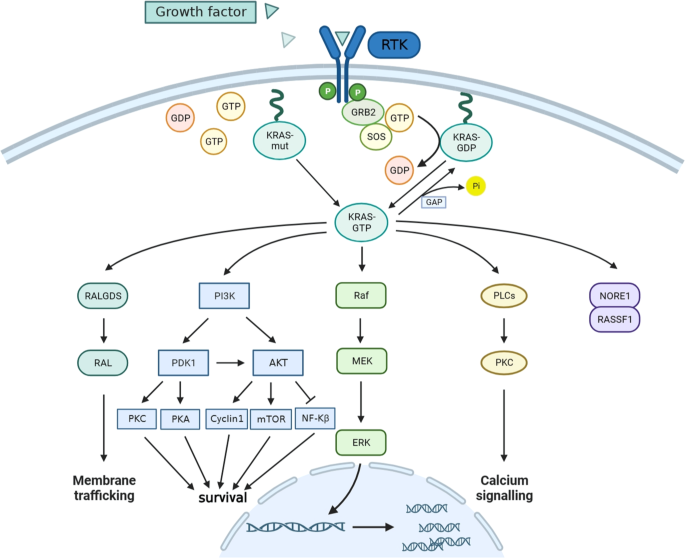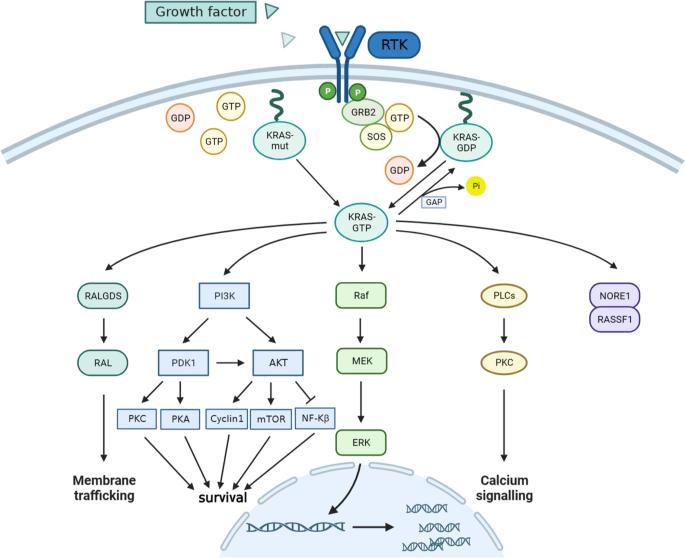Targeting KRASG12D mutation in non-small cell lung cancer: molecular mechanisms and therapeutic potential
IF 4.8
3区 医学
Q1 BIOTECHNOLOGY & APPLIED MICROBIOLOGY
引用次数: 0
Abstract
Lung malignant tumors are a type of cancer with high incidence and mortality rates worldwide. Non-small cell lung cancer (NSCLC) accounts for over 80% of all lung malignant tumors, and most patients are diagnosed at advanced stages, leading to poor prognosis. Over the past decades, various oncogenic driver alterations associated with lung cancer have been identified, each of which can potentially serve as a therapeutic target. Rat sarcoma (RAS) genes are the most commonly mutated oncogenes in human cancers, with Kirsten rat sarcoma (KRAS) being the most common subtype. The role of KRAS oncogene in NSCLC is still not fully understood, and its impact on prognosis remains controversial. Despite the significant advancements in targeted therapy and immune checkpoint inhibitors (ICI) that have transformed the treatment landscape of advanced NSCLC in recent years, targeting KRAS (both directly and indirectly) remains challenging and is still under intensive research. In recent years, significant progress has been made in the development of targeted drugs targeting the NSCLC KRASG12C mutant subtype. However, research progress on target drugs for the more common KRASG12D subtype has been slow, and currently, no specific drugs have been approved for clinical use, and many questions remain to be answered, such as the mechanisms of resistance in this subtype of NSCLC, how to better utilize combination strategies with multiple treatment modalities, and whether KRASG12D inhibitors offer substantial efficacy in the treatment of advanced NSCLC patients.


针对非小细胞肺癌中的 KRASG12D 突变:分子机制和治疗潜力。
肺部恶性肿瘤是全世界发病率和死亡率都很高的一种癌症。非小细胞肺癌(NSCLC)占所有肺部恶性肿瘤的 80% 以上,大多数患者确诊时已是晚期,预后较差。在过去几十年中,已发现了与肺癌相关的各种致癌驱动基因改变,其中每一种都有可能成为治疗靶点。大鼠肉瘤(RAS)基因是人类癌症中最常见的突变致癌基因,其中克氏大鼠肉瘤(KRAS)是最常见的亚型。KRAS癌基因在非小细胞肺癌中的作用尚未完全明了,其对预后的影响仍存在争议。尽管近年来靶向治疗和免疫检查点抑制剂(ICI)取得了重大进展,改变了晚期 NSCLC 的治疗格局,但针对 KRAS(直接或间接)的治疗仍具有挑战性,目前仍在深入研究中。近年来,针对 NSCLC KRASG12C 突变亚型的靶向药物研发取得了重大进展。然而,针对更常见的 KRASG12D 亚型的靶向药物研究进展缓慢,目前尚无特效药物被批准用于临床,许多问题仍有待解答,如该亚型 NSCLC 的耐药机制、如何更好地利用多种治疗方式的联合策略、KRASG12D 抑制剂在晚期 NSCLC 患者的治疗中是否具有实质性疗效等。
本文章由计算机程序翻译,如有差异,请以英文原文为准。
求助全文
约1分钟内获得全文
求助全文
来源期刊

Cancer gene therapy
医学-生物工程与应用微生物
CiteScore
10.20
自引率
0.00%
发文量
150
审稿时长
4-8 weeks
期刊介绍:
Cancer Gene Therapy is the essential gene and cellular therapy resource for cancer researchers and clinicians, keeping readers up to date with the latest developments in gene and cellular therapies for cancer. The journal publishes original laboratory and clinical research papers, case reports and review articles. Publication topics include RNAi approaches, drug resistance, hematopoietic progenitor cell gene transfer, cancer stem cells, cellular therapies, homologous recombination, ribozyme technology, antisense technology, tumor immunotherapy and tumor suppressors, translational research, cancer therapy, gene delivery systems (viral and non-viral), anti-gene therapy (antisense, siRNA & ribozymes), apoptosis; mechanisms and therapies, vaccine development, immunology and immunotherapy, DNA synthesis and repair.
Cancer Gene Therapy publishes the results of laboratory investigations, preclinical studies, and clinical trials in the field of gene transfer/gene therapy and cellular therapies as applied to cancer research. Types of articles published include original research articles; case reports; brief communications; review articles in the main fields of drug resistance/sensitivity, gene therapy, cellular therapy, tumor suppressor and anti-oncogene therapy, cytokine/tumor immunotherapy, etc.; industry perspectives; and letters to the editor.
 求助内容:
求助内容: 应助结果提醒方式:
应助结果提醒方式:


